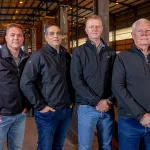By providing financial and banking services to those who need it, Ithala SOC Limited is playing its part in the development of South Africa’s KwaZulu-Natal province.
INTRODUCTION
“An institution such as Ithala SOC Limited must implement sound, attainable and competitive, client-centric strategies in order to remain relevant.”
As Dr Thulani Vilakazi, CEO of Ithala alludes to in this opening statement, the South African banking and finance industry is undergoing change. New businesses are taking the opportunity to establish themselves in what is an increasingly digitised environment where cash is no longer king.
As digital methods dominate financial transactions and consumers become more demanding, the ability to keep up with customer focused needs by implementing various innovations does not just become a trend, but instead a necessity.
Digital solutions, low-cost operating models, and supply chain integration have shifted to the top the agenda for every business in the sector. Institutions such as non-bank financial companies are pursuing various aspects of these developments, giving them the ability to provide their customers with alternative in-house banking solutions.
The result of this is increased competition and a need for adaptation. Traditional banks are being forced into developing solutions that better serve their retail customers and at the same time compete with the new entrants to the market who are already taking advantage of the growing digital and customer-centric sphere.
Ithala SOC Limited is one company in the South African finance industry that is looking to disrupt the market.
Based in the city of Durban, Ithala is a licensed financial services and registered credit provider. It offers financial services that include personal banking, business banking, stokvel banking, and insurance across KwaZulu-Natal (KZN) province, contributing to the socioeconomic development of the region’s people through more than 38 company branches. The business spans the entire province, and for some rural areas of the region it remains the only physical financial institution around.
This is what really sets Ithala apart from its competitors – the fact that, in contrast to major banks in the country, it serves a large population of rural or poorer individuals. Where the banks aim their services towards and cater to the upper echelons of the urban populace, Ithala focuses on the people of outlying areas that are, often, searching for a better quality of life.
And due to this outlook, Ithala has managed to gain a significant and trusted foothold (both economically and with its customers) in the market, at the same time providing financial aid to those who need it the most.
This trust is reinforced by Ithala’s mission to promote development across the province, providing a positive impact through job creation, skills development, and training, and helping to increase individual and family economic security to aid personal and domestic growth.
The company’s promotion of increasing welfare for those who need it is not only aimed to help the individual, but the resulting aid will strengthen infrastructure in KZN – a strengthening of economic roots in order to facilitate region-wide growth.
“It is often said that financial freedom is only for the upper class and not for the average citizens. This insight is a notion that Ithala SOC Limited is trying to dispel,” Vilakazi informs us.
The CEO has been working in the banking and finance for over 13 years and is something of an industry stalwart. He started out at Absa Group, rising to the position of National Manager of New Enterprise Finance in the company. After a successful career with Absa, he joined Standard Bank Group and later became Deputy Managing Director of the company. At Standard Bank Group, and as a former non-executive director of the Malawian Stock Exchange, Vilakazi played a major role in the modernisation of the Malawian banking industry at the time.
Valikazi’s career path has seen him rise to the position of CEO for Ithala, and he welcomes the company’s beneficial impacts and industry challenges that accompany the position.
“Our brand position helps customers reduce debt, improves their financial situations, meanwhile irrespective of which stage in the wealth creation journey they are in. It is ‘Wealth Creation for Ordinary South Africans’,” he tells us.
PEOPLE-CENTRED SERVICES
The people-centric focus of the company is no better exemplified than in its willingness to reach out to its customer base and provide the close physical access many of the region’s consumers need.
In a National Development Plan, the South African government challenged its financial sector to achieve a total financial inclusion of 70 percent of people in the country by 2013, with the target set to 90 percent by 2030.
Up until now, many people who are less affluent within KZN province (especially within remote areas) have had to deal with various issues surrounding banking. Travelling great lengths and incurring unnecessary expenses in order to proceed with financial transactions is one example of these issues, and traditionally access to basic banking services is not negotiable.
But Ithala has sought to change this through bringing financial services closer to those in remote areas. It makes the company the first financial institution to provide banking services to townships and rural areas of KZN – a significantly positive achievement in the industry.
Currently, Ithala operates under a banking licence exemption, but one of the its primary aims is to acquire a Tier 1 Banking Licence in the near future that will open the door for the company regarding economic development, contribution, and most importantly for the firm, an increase in the general welfare of its customer base.
“Banks are important to a country, not just to its finances, but also to economic growth,” Vilakazi adds.
“A banking licence serves to achieve a sound, efficient banking system. Licensing also ensures adherence to best banking practices and reduces systemic failure.
“Although Ithala is a pioneer in banking the unbanked and insuring the uninsured, with more than R6 billion in customer deposits, and having assisted tens of thousands of homeowners, it does not enjoy all the privileges of a fully-licensed bank thus far.”
With the benefits of a full banking licence comes the ability to participate fully in the national payment system. This would bring further stability to Ithala and rid the problem of having to keep applying for extensions, therefore reinforcing the long-term strategic strength of the company on top of other benefits.
“Obtaining a full banking licence and becoming a fully-fledged bank would enable expansion of Ithala SOC Limited’s footprint beyond the borders of KZN, thus broadening our reach and impact on communities outside the province,” Vilakazi says.
The advantage of becoming a state-owned bank is that the company will be able to finance public infrastructure, services, and fiscal policy alongside major key economic sectors, like those of agriculture, small trades, and cooperatives.
“Currently, banking services that are provided to the state are put out to private commercial banks for tender. A state-owned bank will be able to provide financial services to government entities, such as state-owned enterprises and all three spheres of government,” Vilakazi explains.
The future of Ithala will involve investing in the company and the people and communities it serves, activity which will only serve to grow the potential of the region’s economy and society.
Vilakazi concludes by stating that the firm will overcome various challenges posed to the region and company by investing in the growth and development of KZN’s people.
Key priorities include instilling a high-performance culture, creating a sustainable balance of profit and growth and, of course, the acquisition of a full banking licence, a move which will enable Ithala to influence even more lives for the better in the future.























